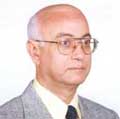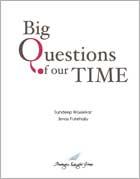Experiments in Arab Renaissance
|
|
February, 2007
By Gitanjali Bakshi
|
Dr. Muthanna Al-Omar and Dr. Hossam Hamdy are not only accomplished scientists in their specialized fields but they have also contributed to technological discourse in the Middle East. Dr. Muthanna Al-Omar is the former Executive Director of the Arab Science and Technology Foundation, an establishment that has made pioneering efforts to stimulate intellectual growth in Arab countries through financial and information resources. Dr. Hossam Hamdy is the Vice-Chancellor for Medical Colleges and the Dean of the College of Medicine at Sharjah University. I met them recently at their offices in Sharjah University.

Prof Hamdy
Gitanjali: What technologies are Arab scientists looking at now or likely to in the next 5 years?
Dr. Al-Omar: Recently, the Arab Science and Technology Foundation sponsored two successful research outcomes by two Iraqi scientists. The first one involves the improvement in cement quality while the second research project concerns a new invention in pharmaceuticals. Arab countries, as is the case of any developing nation, have problems developing state of the art technology. But, in the case of ASTF, given the versatile areas of interest and expertise of our staff the areas of technological development in the future are varied. For instance, the President, Dr. Abdalla A. Alnajjar, would like to focus on technologies that are concerned with renewable energy resources, like solar energy or desalination units, given his area of expertise in physics. As a doctor of environmental science, I would like to underscore the importance of environmental issues whereas; the Director of Information Technology would like the organization to develop a proficiency in IT. Broadly speaking, Arab states are paying attention to all three of these fields, i.e. renewable energy, environmental and information technologies by attempting to inculcate science and technology at all crucial stages of academia; at university, post graduate and scientific research.
Dr. Hamdy: The Arab world is looking to advance in the field of information technology. But, I do not refer to information technology development in a conventional sense. There is a two-part process involved in this procedure; retrieval of knowledge and evidence based decision-making. In order to improve the quality of education and eventually the standard of work, students should be coached on how to access a plethora of data resources and how to critically analyze, appraise and use the best available evidence. If this paradigm shift is adopted and inculcated early in life then future eventual policy makers in any field at all levels, i.e., those who have benefited from this process, can take decisions based on the best available evidence rather than anecdotal opinions and experience.
Gitanjali: What is being done and what are some centers that are being established in order to improve the scientific, academic and technological capacity of the local Arab population?
Dr. Al-Omar: At the moment unfortunately, there are no other pan-Arab establishments or entities, offering grants and funding to science. An organization like the ASTF is a new development initiative. While there is a Science and Technology foundation in Egypt, its focus is mainly on biological issues and they do not offer financial grants to researchers. Within the UAE, ASTF organizes conferences, forums, symposia and workshops that inform as well as train Arab scientists and technologists. We also initiate grant programs to support research in the Arab world as well as create a platform upon which Arab scientists can network with potential investors and funding institutions.
Dr. Hamdy: In recent years many universities have been established in the Middle East. In the UAE there are the Universities of Al Ain, Ajman, and Sharjah, Zayed University as well as the Higher Colleges of Technology. Some of these institutions are semi-governmental, while others are private. Many universities, in Egypt, UAE, Jordan and Lebanon to mention a few, are affiliated with other academic establishments in the West. While partnerships with Western academies allow their Middle Eastern counterparts a higher degree of accreditation, the Western colleges invest in such joint projects to gain a wider international footing. Hence both parties benefit from their symbiotic association and consequently promote a more global outlook. Irrespective of the format what must always be maintained is a certain quality of education, standard of accreditation and an effort to regularly monitor programs.
Gitanjali: Name some of the forward thinking leaders, scientists, businessmen, technologists and educationalists within the Arab world who are involved in initiatives?
Dr. Al-Omar: A few of the progressive scientist are Sameera Islam from Saudi Arabia, Ahmad Ammara and Esa Batarsay from the United States. Currently, ASTF has a database of 6,000 Arab scientists from around the world; some of them are related to the business sectors. Hence we have the facilities to co-ordinate joint networks and projects across international borders and economize on time and energy spent in separate and disconnected R&D efforts.
Dr. Hamdy: Prof. Rafia Goubash, the President of the Arabian Gulf University in Bahrain, a professor of psychiatry and an emirati national and Prof. Nageib El Khaja, Chairman of the Executive Board of the Sheikh Hamdan Bin Rashid Al Makhtoum Scientific Award in Health and a professor of cardiac surgery are the ones that come to mind immediately.
Gitanjali: What are some of the efforts being made by the UAE to impact the rest of the Arab world, in science and medicine?
Dr. Al-Omar: As I mentioned earlier, ASTF is one of the few pan-Arab establishments that solicits grants and offers funding to Science and Technology initiatives. We make it a point to give more attention to poorer nations within the Arab world. Between 2005 and 2008 the organization coordinated funds of $21,201,000 for 61 scientific proposals, supporting 194 beneficiaries. One of our largest investors �€“ the Abdul Lateef Jameer Co., a Jeddah based firm - chose ASTF to manage an annual grant of 1 million US Dollars. There are two important projects that we are currently working on: �€œThe International Initiative to Engage Iraq�€™s S&T Community in Developing its Country�€ and we are also implementing a �€œJoint Arab Project on Water Desalination by Solar Energy�€ with the National Bureau of R&D in Libya.
Dr. Hamdy: Arab Genome, a project based on looking at the genetics of disease in the Arab world.
Related Publications
-
.jpg&maxw=50)
Big Questions of Our time: The World Speaks, 2016
Download:Big Questions of Our time: The World Speaks _Full Report
-

-

Second Freedom South Asian Challenge 2005-2025, 2005
read more
Download:Second Freedom South Asian Challenge 2005-2025 Full Report
Related latest News
Related Conferences Reports
-

Global Challenges Conference, October 2016
Download:Global Challenges Conference Report
-

Conference on Responsibility to the Future: Business, Peace and Sustainability, June, 2008
Download:Global Security and Economy: Emerging Issues


